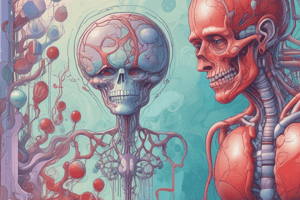Podcast
Questions and Answers
What type of immunity is induced by a vaccine?
What type of immunity is induced by a vaccine?
- Passive immunity
- Active immunity (correct)
- Natural immunity
- Artificial immunity
What is the main function of a toxoid?
What is the main function of a toxoid?
- To kill bacteria
- To cause disease
- To provide passive immunity
- To stimulate the formation of antitoxin (correct)
Which type of vaccine is administered to induce immunity and prevent an infectious disease?
Which type of vaccine is administered to induce immunity and prevent an infectious disease?
- Immuno-globulin (IG)
- Antitoxin
- Live attenuated viral vaccines (correct)
- Killed or fractionated viral vaccines
What is used for passive immunization against measles?
What is used for passive immunization against measles?
Which type of cell is responsible for phagocytosis?
Which type of cell is responsible for phagocytosis?
What is the function of Antitoxin?
What is the function of Antitoxin?
What type of immunization is conducted using Immuno-globulin (IG)?
What type of immunization is conducted using Immuno-globulin (IG)?
What type of vaccine is used against influenza?
What type of vaccine is used against influenza?
What is the result of the subsequent interaction of Ags with bound IgE molecules?
What is the result of the subsequent interaction of Ags with bound IgE molecules?
What is the common origin of all blood cells?
What is the common origin of all blood cells?
What is the function of cytokines in the bone marrow?
What is the function of cytokines in the bone marrow?
What is the location of the thymus?
What is the location of the thymus?
What type of lymphocytes are present in the thymus?
What type of lymphocytes are present in the thymus?
What is the function of lymph nodes?
What is the function of lymph nodes?
What is the purpose of generative organs in the immune system?
What is the purpose of generative organs in the immune system?
What is the name of the factors that stimulate the growth and development of leukocyte colonies from marrow cells?
What is the name of the factors that stimulate the growth and development of leukocyte colonies from marrow cells?
What is the primary function of Helper T cells?
What is the primary function of Helper T cells?
What is the function of Cytolytic T cells?
What is the function of Cytolytic T cells?
What is the origin of mononuclear phagocytes?
What is the origin of mononuclear phagocytes?
What is the role of TH1 cells?
What is the role of TH1 cells?
What is the function of Suppressor T cells?
What is the function of Suppressor T cells?
What is the name of the cells that originate from mononuclear phagocytes once they settle in tissues?
What is the name of the cells that originate from mononuclear phagocytes once they settle in tissues?
Which type of cell is responsible for inducing immune responses?
Which type of cell is responsible for inducing immune responses?
What do Helper T cells secrete to promote immune responses?
What do Helper T cells secrete to promote immune responses?
What is a characteristic of granulocytes?
What is a characteristic of granulocytes?
What is the function of neutrophils?
What is the function of neutrophils?
What is the role of eosinophils in inflammation?
What is the role of eosinophils in inflammation?
What is the function of basophils?
What is the function of basophils?
What stimulates the growth and differentiation of eosinophils?
What stimulates the growth and differentiation of eosinophils?
What is the characteristic of neutrophils that allows them to phagocytose opsonized particles?
What is the characteristic of neutrophils that allows them to phagocytose opsonized particles?
What type of parasites stimulate the production of IgE?
What type of parasites stimulate the production of IgE?
What is the circulating counterpart of tissue mast cells?
What is the circulating counterpart of tissue mast cells?
Where do lymphocytes originate from?
Where do lymphocytes originate from?
What is the function of CD molecules on lymphocytes?
What is the function of CD molecules on lymphocytes?
Which of the following lymphocytes are responsible for producing antibodies?
Which of the following lymphocytes are responsible for producing antibodies?
Where do T lymphocytes mature?
Where do T lymphocytes mature?
What is the characteristic of immature lymphocytes?
What is the characteristic of immature lymphocytes?
What is the function of B-lymphocytes' antigen receptors?
What is the function of B-lymphocytes' antigen receptors?
What is the characteristic of Helper T lymphocytes?
What is the characteristic of Helper T lymphocytes?
What is the result of B-cell activation?
What is the result of B-cell activation?
Flashcards are hidden until you start studying
Study Notes
Immunization
- Immunization can be conducted actively (natural or artificial) or passively (natural or artificial)
- Active Artificial Immunization:
- Vaccine: a suspension of live attenuated or killed microorganisms administered to induce immunity and prevent infectious disease
- Types of vaccines:
- Live attenuated viral vaccines (e.g. measles, mumps, rubella, polio)
- Killed or fractionated viral vaccines (e.g. influenza, hepatitis B, rabies, polio)
- Killed or fractionated bacterial vaccines (e.g. meningococcal, pneumococcal, cholera)
- Toxoid: a modified bacterial toxin that has been rendered nontoxic but retains the ability to stimulate the formation of antitoxin (e.g. diphtheria & tetanus toxoids)
- Passive Artificial Immunization:
- Immuno-globulin (IG): a sterile solution of human antibodies used for passive immunization against measles and for routine maintenance of immunodeficient individuals
- Specific IG: a special sterile solution of human antibody against a specific disease (e.g. hepatitis B immunoglobulin, tetanus immune globulin)
- Antitoxin: a solution of antibodies directed to provide passive immunity as treatment of certain microbial toxins (e.g. botulism antitoxin, diphtheria antitoxin) and poisonous snakebites (e.g. antitoxin against the venom of rattlesnakes)
Cells and Tissues of Immune System
- Cells:
- Lymphocytes
- Mononuclear Phagocytes
- Dendritic cells
- Granulocytes
- Lymphoid tissues:
- Generative organs: Bone marrow, Thymus
- Peripheral organs: Lymph nodes, Spleen, Lymphoid tissues
Lymphocytes
- Origin: bone marrow
- Maturation: generative organs (bone marrow and thymus)
- Functions:
- Recognize and respond to antigens
- Produce antibodies (B-lymphocytes)
- Help phagocytes destroy ingested microbes (helper T-cells)
- Lyse cells that produce foreign antigens (cytolytic T cells)
- Types of lymphocytes:
- B-lymphocytes (produce antibodies)
- T-lymphocytes (helper, cytolytic, and suppressor)
- Helper T cells recognize and respond to cell surface-antigens
- Cytolytic T cells lyse cells that produce foreign antigens
- Suppressor T cells inhibit immune responses
Mononuclear Phagocytes
- Origin: bone marrow
- Maturation: bone marrow
- Functions:
- Engulf and digest foreign particles and microorganisms
- Present antigen to T-lymphocytes
- Types of mononuclear phagocytes:
- Monocytes: precursor cells that mature into macrophages
- Macrophages: mature cells that engulf and digest foreign particles and microorganisms
- Dendritic cells: accessory cells that play important roles in the induction of immune responses
Granulocytes
- Contain abundant cytoplasmic granules
- Participate in specific immune responses
- Types of granulocytes:
- Neutrophils (polymorphonuclear leukocytes)
- Eosinophils
- Basophils
- Functions:
- Phagocytose and destroy foreign antigens
- Participate in inflammation and natural immunity
- Eliminate microbes and dead tissues
Studying That Suits You
Use AI to generate personalized quizzes and flashcards to suit your learning preferences.



